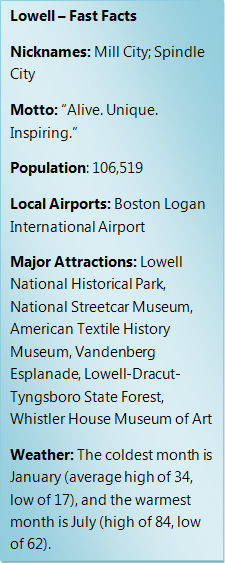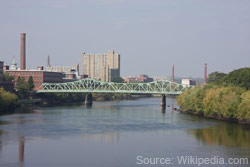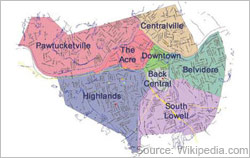 Located in northeast Massachusetts, Lowell has been deemed as one of the safest cities of its size in America. Lowell, which is often cited as "America's first industrial city", is widely recognized as the cradle of the industrial revolution that occurred in the United States in the early 20th century and the city contains a number of historic sites that date back to that era, now preserved by the National Park Service. With over 105,000 residents, it is the fourth largest city in Massachusetts, following Boston, Worcester, and Springfield.
Located in northeast Massachusetts, Lowell has been deemed as one of the safest cities of its size in America. Lowell, which is often cited as "America's first industrial city", is widely recognized as the cradle of the industrial revolution that occurred in the United States in the early 20th century and the city contains a number of historic sites that date back to that era, now preserved by the National Park Service. With over 105,000 residents, it is the fourth largest city in Massachusetts, following Boston, Worcester, and Springfield.
This guide will provide you with some helpful tips and information on just about everything you need to know if you're going to be making the move to Lowell. From the city's neighborhoods and school systems to the employment options and recreational activities available within the city, you'll find it all in this guide so that you can go into your move with the knowledge that is needed to make sure everything goes as smoothly as possible.
Lowell Climate
Lowell has a humid continental climate, typical of most of the New England region and the state of Massachusetts. July is typically the hottest month in the state, while January is the coldest month with temperatures that can drop below 20 degrees.
Because of the humid continental climate that Lowell experiences, the city's summers tend to be very warm and sometimes humid. Spring and fall temperatures are usually pleasant and one of the main attractions in Massachusetts is the perfect fall weather, with mild days and crisp, cool nights. The area may receive occasionally heavy snowfall during the winter season, which occurs from mid-December to early March.
Lowell Geography and Neighborhoods
Located where the Merrimack and the Concord Rivers meet in northeastern Massachusetts, Lowell has a total area of 13.8 square miles and is comprised of eight neighborhoods that include Acre, Back Central, Belvidere, Centralville, Downtown, Highlands, Pawtucketville, and South Lowell. The most heavily populated neighborhood is the Highlands neighborhood, with almost a quarter of the city's total population living in this area. This neighborhood is further divided into Upper Highlands and Lower Highlands sections.
The Downtown and Back Central neighborhoods are mostly urban areas, whereas the Belvidere neighborhood is mainly residential. Belvidere Hill is the historic section of Belvidere and is located along Fairmount Street. These neighborhoods are located in the southeastern portion of the city. In the northwestern area of the city, you'll find the neighborhoods of Pawtucketville (home of the UMass Lowell campus) and the Acre neighborhood.
Living Costs in the City
 The cost of living in Lowell is fairly moderate, with rent prices being comparable to other cities and surrounding areas in the region. The city's location in the northeast and its proximity major cities such as Boston, Hartford, Providence and New York make it a prime location in one of the busiest areas of the country, and this kind of location is typically responsible for a higher cost of living, on average, especially when it comes to real estate costs and secondary expenses. The median family income in Lowell is $51,121, which is right around the national average.
The cost of living in Lowell is fairly moderate, with rent prices being comparable to other cities and surrounding areas in the region. The city's location in the northeast and its proximity major cities such as Boston, Hartford, Providence and New York make it a prime location in one of the busiest areas of the country, and this kind of location is typically responsible for a higher cost of living, on average, especially when it comes to real estate costs and secondary expenses. The median family income in Lowell is $51,121, which is right around the national average.
The median home price for an average home in Lowell is $165,000, low when compared to Lowell's location in proximity to other major metropolitan areas and its geographical location, and slightly lower than the national average as well. Lowell's per capita income is around $22,730, and the employment rate in the city is slowly on the rise.
Registering Your Car
It is necessary for you to have Massachusetts insurance in order to obtain motor vehicle registration. You must have the insurance agent stamp on your application for the vehicle to be registered. Once the application has the insurance stamp, you can take it to any Massachusetts RMV office for processing. You will then receive a registration certificate and registrations must be renewed yearly.
If you already have a driver's license from the state you have moved, you must go to the Massachusetts RMV location and get your license transferred to Massachusetts. You must also submit to a mandatory vision test and pay a transfer fee. And in case you do not have a valid license, you must go through the process of applying for a permit and license. If you are under the age of 18, you will be eligible for a junior operator's license.
Lowell Moving Resources
Moving and storage companies are ready and willing to help you with your move to Lowell, whether you're moving from out of state or from another county in Massachusetts. Make sure you get estimates from multiple moving services before you commit to hiring any (at least three estimates). Check back to our guides for tips on how to choose your moving service wisely with important questions to ask, differentiating between types of estimates, and mistakes to avoid. Visit the following pages at Movers.com to get quotes for the following services:
Lowell Schools
Lowell Public Schools is the district that operates all of the public education within the city of Lowell. The district includes public elementary schools and public middle schools, as well as Lowell High School. Other public schools located in Lowell but not part of the Lowell Public Schools district are Greater Lowell Technical High School, Lowell Middlesex Academy Charter School and Lowell Community Charter Public School. In addition to the public schools in Lowell, there are also a total of 11 private and Catholic schools in the city, including Lowell Catholic High School. Some of the colleges and universities with campuses in Lowell are Middlesex Community College and the University of Massachusetts Lowell.
Lowell Employment
Lowell has a diverse economy. Major sectors include the service, manufacturing, trade, and transport industries. Some of the city's top employers include Lowell General Hospital, with 1,940 employees, Enterprise Bank & Trust, Coca-Cola, Ballard, TRC, and Interstate Container.
The local economy and job market is in a period of growth and the current unemployment rate is 8.5% as of March 2013, on a decline from previous figures in 2011 and 2012, while the job growth rate is at 2.36 percent.
Public Transportation
 The Lowell Regional Transit Authority provides a fixed-route bus service, as well as paratransit services, to the residents of Lowell and also surrounding areas. Lowell is also located in close proximity to a number of highways that include Interstate 495, U.S. Route 3, the Lowell Connector and also Massachusetts Route 3A, 38, 110, 113 and also 133. The Gallagher Transit Terminal has a stop on the Lowell line of the MBTA commuter rail, which provides transportation from Lowell to Boston.
The Lowell Regional Transit Authority provides a fixed-route bus service, as well as paratransit services, to the residents of Lowell and also surrounding areas. Lowell is also located in close proximity to a number of highways that include Interstate 495, U.S. Route 3, the Lowell Connector and also Massachusetts Route 3A, 38, 110, 113 and also 133. The Gallagher Transit Terminal has a stop on the Lowell line of the MBTA commuter rail, which provides transportation from Lowell to Boston.
Culture and Contemporary Life
Lowell is home to a host of unique historic sites, museums, and lively annual festivals that bring in visitors from all over the state of Massachusetts and New England. The Lowell Folk Festival is a three-day folk music festival typically held at the end of July each year, and Winterfest is held each February to celebrate the winter season. In addition, there are several interesting sites to see in the city that include the Lowell National Historical Park, the birthplace of Jack Kerouac, the National Streetcar Museum, the Whistler House Museum of Art and the American Textile History Museum, which celebrates Lowell's beginnings as an industrial city that ushered in America's industrial revolution.
Moving to Lowell
Whatever your reasons for moving to Lowell, whether it be for a change of scenery or for employment, the city beckons you with its charm. The first step in the process of moving to Lowell is choosing a moving company after first checking their BBB ratings, insurance and license. The moving rates are charged by the hour if you are moving within the state boundary, while for a long distance move the charges will depend on the total weight or volume in cubic feet of your belongings. In the latter case, you can ask about a flat rate or any special discounts that are available with the mover.